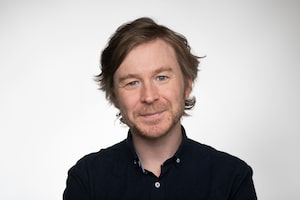Mona Awad has been nominated for her novel 13 Ways of Looking at a Fat Girl.
After she published her first book of short stories in 2003, the acclaimed collection The Rule of Last Clear Chance, Judith McCormack set out to write a novel.
Twelve years later, she published Backspring.
"It took me a long time because I was learning how to write a novel," says McCormack, 62, who is also assistant dean of the graduate program at the University of Toronto's law school. "I thought I knew how to do it, but it turned out to be trickier than I thought."
In the end, she's probably glad she took as much time as she did – not only is McCormack a finalist for this year's Amazon.ca First Novel Award, but she's been nominated in a year when the prize money has increased more than fivefold.
The prize, which has helped kick-start the careers of writers such as Michael Ondaatje, Rohinton Mistry, Anne Michaels, Joseph Boyden and last year's winner Alix Hawley, is celebrating its 40th anniversary; it was established by the now-shuttered literary magazine Books in Canada in 1976 and has been sponsored by Amazon.ca since 2009. The winner of this year's award, to be announced May 26, will receive $40,000 (up from $7,500) while the five other finalists will each take home $4,000 (up from $1,000).
The shortlist was selected by Russell Brown, professor emeritus of English at the University of Toronto, who will choose the winner along with fellow U of T professor, the Walrus magazine's fiction editor Nick Mount and author Gurjinder Basran.
In addition to McCormack, the nominees are Elizabeth Philips for The Afterlife of Birds; W. Mark Giles for Seep; Mona Awad for 13 Ways of Looking at a Fat Girl; Aaron Cully Drake for Do You Think This is Strange?; and Karim Alrawi for Book of Sands.
It's worth noting that, for an award devoted to debut novels, the majority of this year's finalists are well into their writing careers. Alrawi, for instance, who won the HarperCollins Canada/UBC Prize for Best New Fiction in 2013, enjoyed a long career as a playwright before turning to fiction.
"When I think back to being a playwright, when I was in my 20s and 30s, that seemed the right thing for me to be doing," says Alrawi, 58, on the phone from Vancouver. "I couldn't think of writing a novel – it just seemed something that was beyond me.
"Graham Greene has this thing about how a writer's experiences have to be composted before they can be written," he adds. "I guess that I needed time to acquire the experiences … and then compost it all to be able to turn it into a story."
Philips, 54, has been writing for more than three decades, during which time she's published four award-winning collections of poetry. But "I always wanted to write a novel," she says. "I started a novel in 1990 that, actually, has one of the characters that ended up in [The Afterlife of Birds]. But, at the time, I was making good sentences, but it wasn't really going anywhere. I think I was just too young."
The publishing industry (and the media) tends to lionize younger writers – consider Granta's career-making lists of the best young novelists that get published once every decade or so, or The New Yorker's list of the best 20 fiction writers under the age of 40 that appeared in 2010. Publishing, says the 48-year-old Aaron Cully Drake, "puts a premium on youth."
"Kids in their 20s come up with really interesting stuff," says Drake on the phone from Coquitlam, B.C. "But once you hit your 30s, you've got a little bit of grey in your beard. You've got a couple of scars on your fingers. You've got some things to say."
At 37 years of age, Awad, who says she didn't "seriously" start writing fiction until her mid-20s, is this year's youngest nominee by more than a decade. "But I don't feel particularly young," she says, on the phone from Denver, where she's pursuing a PhD in creative writing. "It did take a number of years to write this book, and I thought about it for a long time. So it feels like I've been writing for quite a while."
Calgary's W. Mark Giles, 58, published his first short story in a magazine in 1992, only to quit for almost a decade before returning to writing – he published a short-fiction collection, Knucklehead & Other Stories, in 2003. He says "je ne regrette rien" when I ask if he wishes he'd devoted himself to writing earlier in his life.
"I think it happened the way it had to happen," he says. "We have to go through life's journey – I know that sounds corny, but it's true. Do I look back and think, 'Oh jeez, if I had only had it together when I was 22'? Sure, that would have been great. But that just wasn't how I was then. Or even when I was 32. I wasn't a writer yet."
 Mark Medley
Mark Medley